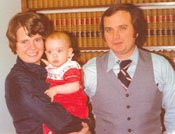Judging from a decision by the 5th Circuit Court of Appeals yesterday, the cancer-inflicted wife of convicted Mississippi attorney Paul Minor will likely die without her husband.
Minor asked a three-judge panel to consider allowing him out on bond pending appeal, but the panel rejected his request Thursday, despite news from Sylvia Minor's doctor that she likely only has weeks, if not days, to live.
Minor's lawyer Hiram Eastland told the Jackson Free Press that Sylvia was so far along that she drifted in and out of consciousness during his last three-hour visit in February. It was doubtful that Minor's wife even remembered seeing her husband's face.
Minor has asked the panel to consider throwing out his 2007 corruption conviction because of unacceptable jury instructions. U.S. District Judge Henry Wingate, after presiding over the prosecution's failed attempt to convict Minor in an earlier corruption trial, instructed the jury in 2007 that they did not have to find any proof of a bribery in Minor's corruption case. The three-judge panel appeared to find these instructions questionable during an April 1 hearing.
Judge Will Garwood asked U.S. Department of Justice attorney Elizabeth Collery last week to outline the specific deal that Minor had allegedly made with any of the judges. Collery said no specification was required.
"The instruction allowed the jury to convict if they believed that when Minor gave the bribes he didn't have a specific case in mind, a pending case. The bribes could be in connection with some future proceeding," Collery said.
Judge Catharina Haynes also sounded unsure of the instruction: "All right. But you agree that there has to be some kind of agreement, OK; I'm going to give you money and you're going to rule in my favor on X in some way," she said. "[W]hat is your contention of what that agreement was? Because neither of these two cases (used to convict the defendants) that we have been presented were pending in front of those judges at that time as I understand it. … And one of them wasn't even a judge yet."
The panel, though cautious about the jury instruction, based their decisions to hold Minor in jail upon the earlier decision of a judge who later recused herself from the panel because of her political connections to the case.
Eastland pointed out Judge Pricilla Owen's connections to former White House Chief of Staff Karl Rove in a March 31 letter to Owen, saying that Minor "has consistently accused Mr. Rove with improper conduct in office and specifically with exerting improper political influence over the decision to prosecute him."
Minor wrote in a letter to a congressional panel investigating Rove's connections to the politicization of the U.S. Department of Justice under former president George Bush and the DOJ's alleged targeting of Democrats.
"t has become increasingly clear that Karl Rove … conceived a strategy to dry up political money to Democratic candidates which included using the Justice Department as an instrument to prosecute prominent Democrats, particularly trial lawyers," Minor wrote in one letter.
Rove repeatedly refused to come before the congressional panel investigating his connections to the politicization of the U.S. Department of Justice, and instead invoked executive privilege.
Owen had hired Rove as a campaign manager for $250,000 to help her in her run for Texas Supreme Court in 1994 and often campaigned with George W. Bush and Rove during Bush's campaign for Texas governor. Bush later nominated Owen to the 5th Circuit. Her connection to Rove was close enough that she responded to Eastland's letter by recusing herself from the panel.
Nevertheless, the panel put enough value in Owen's earlier decision that Minor should remain in prison. The panel told Minor that he could still petition the Federal Bureau of Prisons for a temporary release, though that situation is not necessarily an improvement. Minor had always qualified for a temporary release from the Federal Bureau of Prisons. His last temporary release, however, only got him three hours with his wife in February.



Comments
Use the comment form below to begin a discussion about this content.